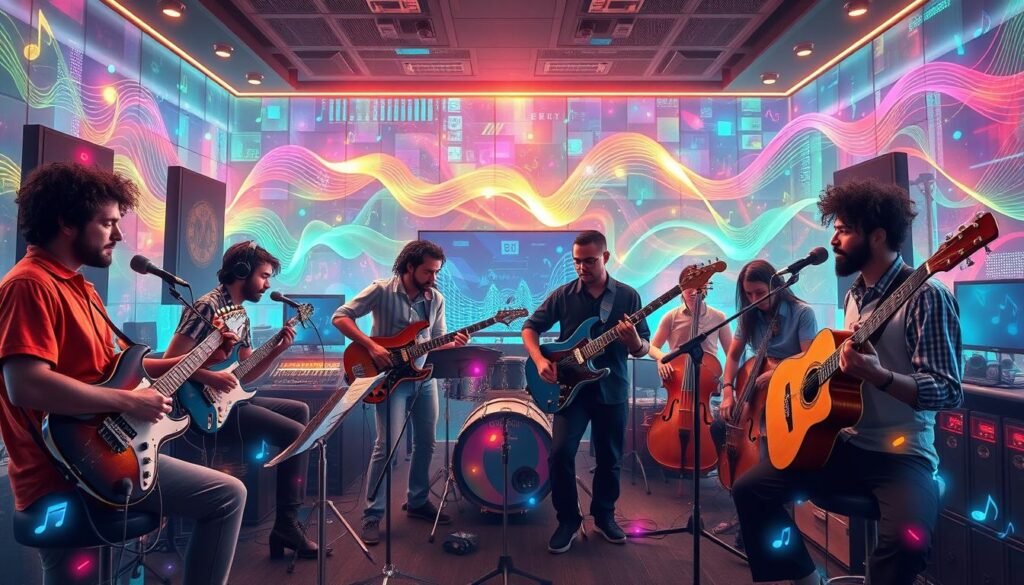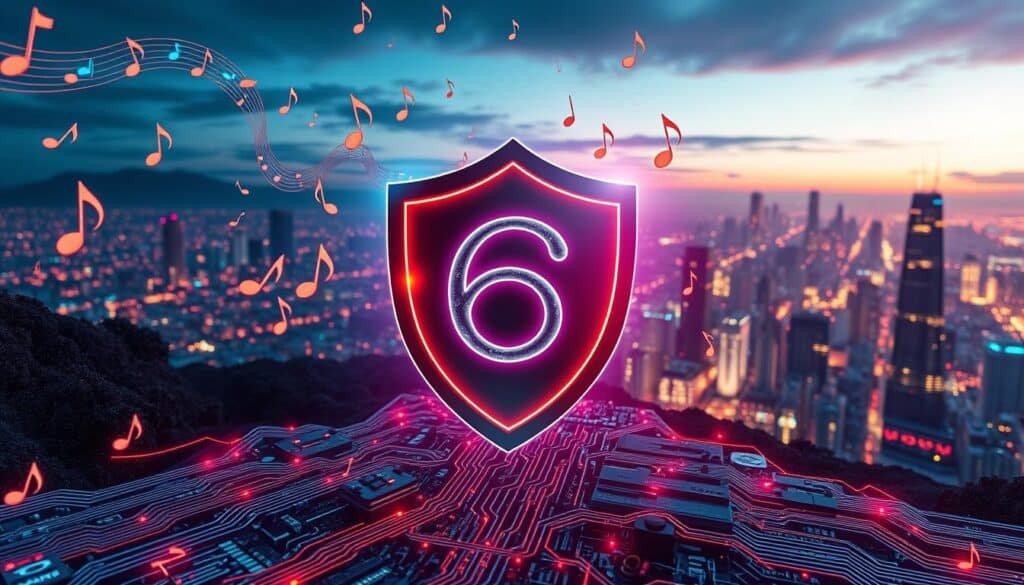The music industry has changed a lot with digital platforms and streaming. Now, 65% of music sales come from streaming worldwide. This makes starting a virtual music career very promising.
Also Read: What Are The Challenges Of Navigating A Global Music Career?
In 2022, the US music industry made $15.9 billion. About 82.2 million Americans pay for music streaming. Thanks to technology, artists can now make and sell music from home. This has opened up new paths for virtual music careers.
Key Takeaways
- The music industry has undergone a significant shift towards digital platforms and streaming, creating new opportunities for virtual music careers.
- The US music industry generated $15.9 billion in revenue in 2022, with a growing number of paid music streaming subscribers.
- Advancements in technology have made it easier for artists to create, produce, and sell music remotely, enabling the rise of virtual music careers.
- Leveraging digital tools and platforms can help artists build a successful virtual music career and connect with audiences globally.
- Adapting to the changing industry landscape and embracing virtual opportunities can be crucial for the long-term success of music professionals.
Understanding the Modern Music Industry Landscape
The music industry has changed a lot, moving from physical formats to digital ones. This change has changed how we find, listen to, and make money from music. Now, over 75% of the industry’s money comes from digital streaming services.
Also Read: What Are The Essential Steps For Music Career Development?
The Rise of Digital Music Distribution
Going digital has opened new doors for artists to share their music worldwide. Independent artists, for example, now make up 34% of music listened to online. Sites like Spotify and SoundCloud are key places for finding new music and artists.
Current Industry Revenue Streams
Streaming is the big earner, but other areas like merchandise and sync placements are also important. For new musicians, streaming royalties make up 62% of their income. This shows how big digital platforms are in today’s music world.
The Shift from Traditional to Digital Platforms
The move to digital has changed the music industry a lot. In the last five years, digital music listening has grown by 120%. Spotify, with over 500 million users, leads the way in how we find and listen to music. Even in places like South India, digital platforms help local music get noticed.
This digital shift has brought new chances for artists, producers, and music pros. Getting an education in music production, digital marketing, and data analysis is becoming more important. These skills help people succeed in today’s digital music scene.
| Metric | Value |
|---|---|
| Streaming Royalties as % of Emerging Musicians’ Income | 62% |
| Digital Music Consumption Growth in Last 5 Years | 120% |
| Spotify Global Users | 500 million+ |
| Independent Artists’ Share of Music Consumption on Online Platforms | 34% |
| Music Industry Revenue from Digital Streaming | Over 75% |
“The digital revolution has fueled significant growth in India’s music industry, emphasizing the importance of regional and independent music promotion in the global market.”
Essential Tools and Software for Virtual Music Production

In the world of music production, virtual tools and software are key for musicians and producers. They help build a successful online career. The options range from digital audio workstations (DAWs) to recording and editing software.
Also Read: What Are Hyper Local Music Communities And How Do They Work?
The digital audio workstation is a cornerstone in virtual music production. Ableton Live, FL Studio, and Logic Pro X are popular choices. They let creators record, edit, and mix music with great precision. These DAWs also come with sound libraries like Apple Loops, offering a lot of musical resources.
Third-party sound libraries and sample packs add more creativity. Brands like Native Instruments and Spitfire offer high-quality virtual instruments and sounds. They support many musical styles and genres.
New technologies like AI and virtual reality are changing virtual music production. Tools like KORG Gadget give immersive 3D experiences. They mix the physical and digital in music creation.
For a smooth virtual music production workflow, high-speed internet is essential. It makes collaboration, file sharing, and virtual sessions easy. Musicians can work together from anywhere.
Education and training are also important in virtual music production. Many schools offer special programs. Online courses like the NYU x Billboard | Music Industry Essentials program provide detailed training for producers.
By using virtual tools and software, musicians can open up new opportunities. They can create, collaborate, and succeed in the digital music world.
Virtual Music Career: Building Your Online Presence

In today’s world, having a strong online presence is key for musicians. Social media is a powerful tool for artists to connect with fans and promote their music.
Also Read: How Can You Navigate A Successful Music Career Guide?
Leveraging Social Media Platforms
Platforms like Instagram, TikTok, and YouTube are great for musicians. Instagram Live lets you talk to fans in real time. TikTok is perfect for making music go viral. By posting interesting content, artists can engage with fans and share their music.
Creating Engaging Content
- Make sure your visual identity is the same on all social media.
- Share behind-the-scenes stuff, exclusive content, and personal stories to connect with fans.
- Use Instagram Reels and TikTok challenges to make content that people want to share.
- Try live streaming on Twitch, YouTube, and YouNow to earn money from subscriptions and tips.
Building a Personal Brand
Creating a unique personal brand is crucial in the music industry. Spend time on a unique image, sound, and message that speaks to your audience. Use your online space to show your art, share your story, and grow a loyal fan base.
“The key to building a successful virtual music career is to create a strong, authentic online presence that allows you to connect with your audience and share your music in meaningful ways.”
Monetization Strategies in Digital Music

In today’s digital music world, artists have many ways to make money. They can use big streaming sites or new ideas to earn more. This helps them grow their music career online.
Streaming Revenue: Sites like Spotify are key for making money. Artists get a share of the money from streams. In 2023, this made up 68% of the world’s music income (IFPI).
For example, Spotify made $10.4 billion in Q1 of 2024. This shows how much money artists can make from streams.
Also Read: What Are Cinematic Music Experiences And Why Are They Popular?
Direct-to-Fan Sales: Bandcamp lets artists sell music straight to fans. This way, artists keep more of the money. It also helps artists connect closely with their fans, who buy more music and merchandise.
Alternative Payment Models: New sites like Resonate let fans buy music as they stream it. This model is different and lets artists try new ways to make money. It also helps artists build strong relationships with their fans.
Subscription-based Models: Patreon lets artists offer special content to fans who pay a monthly fee. This way, artists get a steady income. It also lets them connect more with their most loyal fans.
Live Streaming and Virtual Performances: Sites like Twitch and Stationhead let artists perform live online. They can make money from tips and sponsorships. This market is growing fast and could be worth $223.5 billion by 2028 (Grand View Research).
By using different ways to make money, artists can do well in the digital music world.
| Monetization Channel | Key Benefits | Projected Market Growth |
|---|---|---|
| Music Streaming | Royalty-based revenue sharing | $26.6 billion in the US by 2025 (expected) |
| Direct-to-Fan Sales | Higher revenue share for artists | $5.3 billion global music licensing market by 2025 (Grand View Research) |
| Live Streaming | Virtual performances, tips, sponsorships | $223.5 billion global live streaming market by 2028 (Grand View Research) |
| Subscription-based Models | Recurring revenue, fan engagement | 20-30% increase in ticket sales for tours with a strong social media presence (Eventbrite) |
Collaboration and Networking in the Virtual Space

The music industry has changed a lot with digital tech. Now, artists can work together from anywhere. This has created virtual music communities where musicians can connect and share ideas.
Finding and Working with Remote Musicians
Tools like Muse Session and Sessionwire make remote music collaboration easy. They let musicians share files and work together in real time. Sites like BandLab help artists work on projects together online.
Good communication is key for working well with others online. It’s important to set clear goals and check in often. Building trust with your team is also crucial.
Virtual Music Communities
Platforms like Discord are great for virtual music communities. Musicians can share their music, talk about their work, and find new collaborators. These spaces help artists grow and reach more people.
Online Collaboration Tools
New tools like Melodify have changed how musicians work together. They offer features like video calls, file sharing, and version control. These tools help artists stay connected and work efficiently, no matter where they are.
The music industry is always changing, and remote music collaboration is becoming more important. By using digital tools, artists can build successful careers and connect with people all over the world.
Protecting Your Digital Music Assets

In the virtual music world, keeping your digital music safe is key. Use strong passwords, virtual private networks (VPNs), and secure cloud storage to block unauthorized access. The Content Delivery and Security Association (CDSA) has a Music Recording Studio Security (MRSS) program. It guides you in protecting your digital music.
Artists must also know about copyright laws. Make sure to register and protect your work on digital platforms. The U.S. Copyright Office charges $65 for a single music work. This gives you legal protection for your work. AI tools like YouTube’s Content ID also help by scanning for copyrighted music.
New tech like blockchain is changing how musicians handle their digital rights. Musicoin and Ujo Music use blockchain for fair music rights management. This stops unauthorized use of your music.
As the music world grows, keeping your digital music safe is more important than ever. Use strong security, know copyright laws, and try new tech. This way, you can protect your work and grow your virtual music career.
| Digital Asset Type | Examples |
|---|---|
| Imagery | Photos, illustrations |
| Digital Content | Videos, website content, social media posts |
| Software | Company apps, proprietary business processes |
| Intellectual Property | Customer databases, trademarked or patented digital materials |
Keeping your digital music safe is vital for a successful virtual music career. Use strong security, understand copyright laws, and try new tech. This way, you can protect your work and ensure your music business thrives.
“Securing your digital assets is like locking your virtual studio door – it’s the first line of defense against unauthorized access and potential losses.”
Also Read: Top Music Career Tips For Beginners
Conclusion
To succeed in a virtual music career, you need to adapt to the digital world. Use the right tools and platforms, and connect well with your audience online. The music industry is changing, and new chances for artists are opening up.
By using new tech, working together online, and keeping your digital stuff safe, you can do well in today’s music scene. The future of music careers is all about being online. This brings both challenges and big chances for growth and success.
Social media has changed how artists meet fans, share music, and get noticed. It lets independent musicians show their talents worldwide. With digital music sharing and new ways to make money, the virtual music world is full of promise for those ready to explore it.
By diving into the virtual world, musicians can use great tools for making music, build a strong online image, and explore new virtual and augmented reality markets. Working together online and networking can open up new paths for creativity and success. As the digital music world keeps changing, a successful virtual music career depends on being flexible, innovative, and smart about protecting your digital stuff.
FAQs
Q: What job opportunities are available in the virtual music industry?
A: The virtual music industry offers a range of job opportunities including roles such as music producer, manager, event coordinator, and marketing associate. These positions can be found in major music hubs like Los Angeles and New York, as well as remotely.
Q: How can I enhance my creative skills for a successful music career?
A: To enhance your creative skills, consider enrolling in programs focused on music technology or contemporary music. Participating in workshops, online courses, and collaborating with other artists can also help develop your talents and expand your creative expression.
Q: What is the importance of a manager in building a virtual music career?
A: A manager plays a crucial role in the virtual music career by overseeing the artist’s brand, scheduling events, and facilitating connections within the industry. They can help an artist navigate contracts, music publishing, and promote their work effectively.
Q: How can I apply for music industry programs in Los Angeles or New York?
A: To apply for music industry programs, research various academies and educational institutions in Los Angeles and New York. Many offer virtual options, allowing you to apply online. Make sure to prepare your portfolio and any required documentation to enhance your application.
Q: What are some effective ways to promote my music virtually?
A: Effective ways to promote your music virtually include utilizing social media platforms, creating engaging content, and leveraging music streaming services. Collaborating with other artists and participating in virtual events can also help increase visibility and reach a broader audience.
Q: How can I find a music producer to work with on my projects?
A: To find a music producer, consider networking within the virtual music community, attending online workshops, and using platforms that connect musicians with producers. Look for individuals who have experience in music technology and a style that complements your vision.
Q: What role does music publishing play in a virtual music career?
A: Music publishing is vital in a virtual music career as it involves the management and exploitation of musical works. It helps artists earn royalties, protects their rights, and ensures their music is properly licensed for use in film, advertising, and other media.
Q: How can I balance my mental health while pursuing a career in the music industry?
A: Balancing mental health in the music industry can be achieved through establishing a routine, setting realistic goals, and utilizing resources such as therapists or support groups. It’s important to acknowledge your limits and prioritize self-care amidst the demands of a creative career.
Q: What are the benefits of participating in live performances for a virtual music career?
A: Participating in live performances, even virtually, can significantly enhance your music career by providing exposure, building a fan base, and improving your performance skills. Events such as virtual concerts and interactive showcases allow you to connect with audiences globally.
Source Links
- https://www.iheartmyvoice.com/blog/your-profitable-virtual-gig
- https://www.virtualdays.com/best-practices-for-hosting-a-virtual-concert-or-album-release-online/
- https://www.benjamingroff.com/blog/writing-and-recording-remotely-with-virtual-sessions/
- https://mdlbeast.com/xp-feed/music-industry/the-evolution-of-music-in-the-digital-age
- https://vocal.media/fyi/the-future-of-music-careers-how-digital-platforms-are-redefining-the-industry
- https://www.yellowbrick.co/blog/music/10-essential-music-production-tools-for-professional-sound
- https://emastered.com/blog/music-production-equipment
- https://www.careersinmusic.com/music-making-software/
- https://www.musicianindiecoalition.com/blog/digital-marketing-for-musicians
- https://blog.novecore.com/how-to-build-a-successful-music-career-in-the-digital-age/
- https://www.bridge.audio/blog/monetization-strategies-for-the-modern-music-industry/
- https://vocal.media/education/the-ultimate-guide-to-boosting-your-music-career-with-digital-tools
- https://www.linkedin.com/advice/3/how-can-you-make-most-virtual-collaboration-music-vqgye
- https://www.vampr.me/faq/social-networking-for-musicians-collaborate-and-connect/
- https://www.linkedin.com/advice/0/heres-how-you-can-unlock-new-opportunities-music-l2m2f
- https://www.auditboard.com/blog/how-to-protect-your-digital-assets/
- https://www.memcyco.com/top-digital-asset-protection-methods/
- https://medium.com/@giant_chen1688/protect-your-music-from-ai-theft-5-steps-to-safeguard-your-creativity-in-the-digital-age-7bbd643bfff2
- https://www.yellowbrick.co/blog/music/exploring-the-impact-of-social-media-in-the-music-industry
- https://pmc.ncbi.nlm.nih.gov/articles/PMC7286426/




